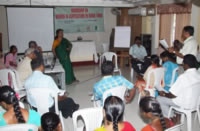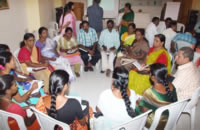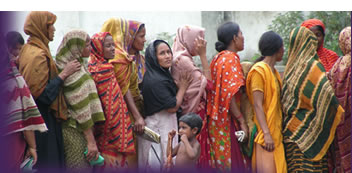|
|
|
Community Led Workshops |
|
 Our programme team conducted three community-led workshops.
The objectives of the workshops were as follows: Our programme team conducted three community-led workshops.
The objectives of the workshops were as follows:
- Share the findings from the demand and supply study
- Obtain comments from different stakeholders (Government, NGOs and the rural women community)
- Elicit ideas for designing better programmes for women.
We used the design template developed in the previous project (Development of the Cafeteria for Women in Agriculture) to obtain inputs, comments and suggestions.
The workshops were organized in the following locations:
- Pudukkottai in Pudukkottai District of Tamilnadu on 4th February, 2008
- Ongole in Prakasam District of Andhra Pradesh on 6th February, 2008.
- Hyderabad of Andhra Pradesh on 8th February, 2008.
Major Findings
- There was a general agreement that the programmes for women in agriculture reach only a limited set of rural women. Keeping in view the existing resources, institutional arrangements and operational constraints, nothing more could perhaps be achieved.
 With a few exceptions, most of the government and NGO workers do not like to admit publicly the limitations of their programmes (programme design and implementation). Many believed that the following participatory approaches have made their programmes demand-driven: participatory rural appraisal techniques; working with the women self-help groups (SHGs); and setting the research and extension agenda based on farmer consultations. With a few exceptions, most of the government and NGO workers do not like to admit publicly the limitations of their programmes (programme design and implementation). Many believed that the following participatory approaches have made their programmes demand-driven: participatory rural appraisal techniques; working with the women self-help groups (SHGs); and setting the research and extension agenda based on farmer consultations.
- The government officials involved with these programmes failed to recognise the need for adopting better ways of designing relevant programmes. They do not see any practical ways forward. NGOs do recognize the need for change and could appreciate some of the suggested design principles. However, as many of them are implementing programmes that are developed by someone else (government or donors), they are not very clear about their role in evolving or adopting better designs for reaching women.
- People from villages and communities see no real benefit or value in existing programmes. They are unable to concretise their ideas and express their needs in terms of programme design. However, they clearly articulated the demand for programmes related to small-holding livestock, small business ventures, value addition, marketing products, and ways of improving remuneration and conditions of unskilled and migrant labourers.
IMPLICATIONS FOR PROGRAMME DESIGN |
What is required across the rural sector is a radically different approach to developing programmes for rural women that focus on the current livelihoods of rural women, their support requirements and leveraging capital, human resources and market opportunities.
There is a need to experiment with and build evidence on how this could be done (methodology development) in real life setting with minimal costs and in a relatively short time frame. |
|
|
|


